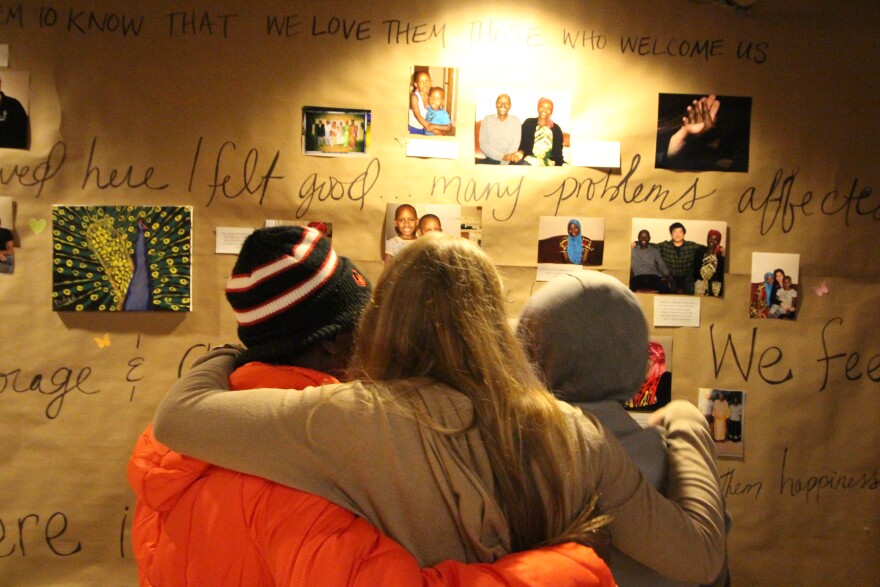After three years of waiting for special immigrant visas, a family from Iraq finally arrived in Anchorage last fall. They were seeking safety. Then, on January 27, President Trump signed an executive order, and everything seemed to change. At the family’s request because of concerns for their security, Alaska Public Media is not using their names.
It’s mid-December and a middle-aged father sat at the dining table in his small Anchorage apartment, a tray loaded with tea and cookies on the table. He’s talking about the process of getting his four kids ready for school.
“In Iraq, I wake them up every day," the father said. "Wake up them by water, by whatever. Because they don’t want to go to school. But here they wake up alone. They go to bus alone. I don’t wake up them. This is a very good sign to me.”
The father was talking to Vikram Patel, a radio producer who interviews people about what it’s like to be a new arrival in Anchorage. The oldest son joins the conversation.
PATEL: “What’s your favorite part about school?”
SON: “My favorite part is play soccer because it’s my favorite sport.”
PATEL: “Your dad thinks your favorite part may be that there’s girls at school now.”
SON: “Yeah, maybe, yeah. (laughs)”
The mother sits at the table, dressed in a heavy winter coat.
“I like the snow. I like snow very much!" The mother said. "Because this is first time to me. In Iraq, no snow.”
Most of the conversation reflects what it’s like for any family to move to a new city – new jobs, new activities. The father talks about his work fixing high tech medical equipment. The mother, who used to teach, is going back to school and studying English. But for this family, being in Anchorage boils down to one key thing:
“For us, really the favorite part is safety.”
They moved to Alaska because the father used to work as an engineer for the U.S. Army, which made him a target in Iraq. He said his father, his father-in-law and other family and friends have all been killed by militias. Bombs go off in the street. His life was threatened three times, forcing them to move to different places around Baghdad. So he applied for a visa to leave.
During their first few months in Alaska, they reveled in the safety. The father told the story of the ski patrol at Alyeska helping his boys when they were lost, and talks about a time when the police showed up to help them deal with a rowdy neighbor.
“I think here, the government protect all people,” the father said.
Fast-forward to late January. President Trump signed an executive order temporarily banning people from Iraq and six other Muslim-majority countries from traveling to the United States. He suspended the refugee program, too.
A few days later I sat down with the parents. The cookies, the tea and the warm greetings are the same as during Vik’s interview, but the mood is very different. The mother said when they first arrived in the U.S. she felt very welcomed by everyone.
“I told to my husband I’m very happy because no problem with Muslims," the mother said. "Why now it’s a problem? Muslim a problem now?”
The mother said she’s afraid when she goes outside that people will try to pull off her headscarf or will try to hurt her. Her husband suggested she stop wearing a scarf for her safety because God would understand why she made the choice.
The father said they’re also afraid for his sister and her family, who fled death threats Iraq and are now in Turkey, wanting to join them in Alaska.
“So they now waiting and in small hope they coming," the father said. "But with Trump decision, no they are very disappointed. They are very sad.”
The couple try to explain what they see as a misunderstanding. Some people conflate all Muslims with members of the so-called Islamic State. Here they refer to that organization by its Arabic acronym, Daesh.
“I am, don’t like Daesh. Don’t like bomb. Don’t like kill any people,” the couple said. “There is war in Iraq with Daesh. Muslim, they both Muslim, no Christian at war with Muslim. What does that mean? That all Muslim Daesh? Why they fight them? Because they are not good people. I don’t know what they believe but they do not represent Islam.”
They explained that they are Muslims fleeing the violence of other people who call themselves Muslims.
This family didn’t want to leave their home in Iraq. They had good jobs there, a large house with plush red couches, an energetic German Shepherd named Rocky.
“But I come to USA to save to my kids, and my husband," the mother said. "What I do now? I can’t back to my country. I can’t do that.”
Through a series of court rulings, Trump’s executive order has been put on hold and is not currently being enforced. The long-lasting impacts of the ban and its rhetoric are still unclear.



